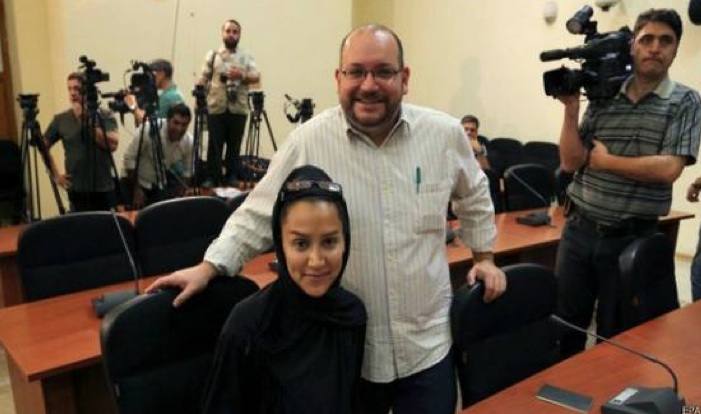
May 26. 2015 The Washington Post – By Carol Morello – Washington Post reporter Jason Rezaian went on trial Tuesday on espionage charges in a closed-door session held more than 10 months after he was detained, Iran’s official news agency reported.
The proceedings were adjourned after about two hours, the state-run Islamic Republic News Agency (IRNA) said, but it gave no details on the charges or any actions in the Revolutionary Court trial. No family members or independent observers were permitted inside the courtroom — bringing denunciations from press freedom groups and others.
News reports have said Rezaian’s wife, a correspondent for The National newspaper in Abu Dhabi, and a local photojournalist face similar charges. But the status of their cases was not immediately clear.
The trial of Rezaian, The Post’s Tehran bureau chief who was born and raised in California and holds U.S.-Iranian dual citizenship, follows more than 10 months in custody since he was arrested July 22, 2014. His wife Yeganeh Salehi, an Iranian national, was also arrested at the time and later released on bail.
alehi and Rezaian’s mother, Mary Rezaian, went to the courthouse Tuesday but were not permitted access to the trial, according to Rezaian’s brother, Ali Rezaian. He said they waited for several hours until a clerk told them that the proceeding was over.
Ali Rezaian said the hearing was adjourned, and it was not clear when it would resume. Mary Rezaian has been in Tehran for the past two weeks hoping to attend her son’s trial.
Jason Rezaian’s attorney, Leila Ahsan, told the family that the trial “opened today in the Revolutionary Court with the judge reading the indictment against him.”
“The proceeding will continue at a later session,” Ahsan said, according to the family.
Under Iranian law, it is a crime to reveal details of a closed-door hearing, and the lawyer informed the family that she is unable to say more at this juncture.
During months of nuclear negotiations with Iran, the State Department has repeatedly raised the case of Rezaian and two other Americans already convicted in Iran: former U.S. Marine Amir Hekmati and pastor Saeed Abedini, as well as a missing former FBI agent, Robert Levinson.
alehi and Rezaian’s mother, Mary Rezaian, went to the courthouse Tuesday but were not permitted access to the trial, according to Rezaian’s brother, Ali Rezaian. He said they waited for several hours until a clerk told them that the proceeding was over.
Ali Rezaian said the hearing was adjourned, and it was not clear when it would resume. Mary Rezaian has been in Tehran for the past two weeks hoping to attend her son’s trial.
Jason Rezaian’s attorney, Leila Ahsan, told the family that the trial “opened today in the Revolutionary Court with the judge reading the indictment against him.”
“The proceeding will continue at a later session,” Ahsan said, according to the family.
Under Iranian law, it is a crime to reveal details of a closed-door hearing, and the lawyer informed the family that she is unable to say more at this juncture.
During months of nuclear negotiations with Iran, the State Department has repeatedly raised the case of Rezaian and two other Americans already convicted in Iran: former U.S. Marine Amir Hekmati and pastor Saeed Abedini, as well as a missing former FBI agent, Robert Levinson.
“Iran must end this travesty of justice immediately,” said Sherif Mansour, Middle East and North Africa program coordinator for the Committee to Protect Journalists. “After more than 300 days of unwarranted detention, the least Iran could do is to release Rezaian on bail and grant his employer entry to the country and access to the legal proceedings.”
It is difficult to know exactly what the case against Rezaian is based upon, because the proceedings have been secretive. What is known comes mostly from sparse Iranian media accounts and from what Ali Rezaian has said.
The Post tried to obtain a visa for an editor to be in Iran during Rezaian’s trial, but its inquiries were not answered, according to executive editor Martin Baron. He called the treatment of Rezaian in the Iranian justice system “shameful” and “disgraceful.”
Rezaian has been held in Tehran’s Evin Prison, where political prisoners and journalists have been taken for interrogation. His initial months were spent in solitary confinement, and he suffered health problems exacerbated by his lengthy detention. He eventually was allowed outside to see physicians.
[New statement from Martin Baron ahead of Jason Rezaian’s trial in Iran]
His case was assigned to a judge known for his harsh sentencing in the past, which has included the death penalty for anti-government protesters.
Rezaian’s family had to seek several lawyers before recently finding one, Ahsan, who agreed to take the case and whom the court would accept as counsel. They have met only once to discuss the case, for about 90 minutes.
She has told the Iranian media that Rezaian is accused of four serious charges, including espionage, in what she said stemmed from his journalistic pursuits.
“No evidence has ever been produced by prosecutors or the court to support these absurd charges,” Baron said Monday. “The trial date was only disclosed to Jason’s lawyer last week. And now, unsurprisingly but unforgivably, it turns out the trial will be closed.”
In recent days, the State Department and the Committee to Protect Journalists have called on Iran to open the proceedings in Tehran’s Revolutionary Court to the public, to no avail.
The court’s spokesman told reporters in Tehran that only the judge in the case can decide to make a trial public or comment on it.
Brian Murphy in Washington contributed to this report.
